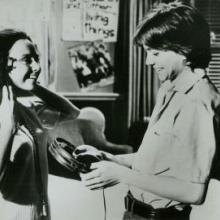1970s
THE NIGHT ED SPIVEY JR. first came to our Sojourners community house in Chicago, he made me laugh. He still does, more than anybody else I have ever known. But it was also evident how serious he was about his faith and its meaning for his life. Ed was raised as a Southern Baptist, and he told us a funny story of how his Baptist pastor in Chicago wanted his congregants to wear a button to work that said, “I’m Excited!” When people ask why, you were supposed to say, “I’m excited about Jesus.” But Ed was in his first job after college — as art director of the Chicago Sun-Times Sunday magazine, where he was the youngest hire in the newsroom — and he was reluctant, to say the least. While he found the button idea tacky, it was clear that he was excited about following Jesus wherever that road would lead.
That’s what we talked about at our first dinner together. Some of us were still seminary students at Trinity Evangelical Divinity School, and we had just started a new publication called The Post-American, forerunner to Sojourners. None of us had ever done a publication before, or much writing beyond leaflets and school papers. Our art director was both temporary and part-time, and we would often wait weeks before our articles were laid out for printing. It took us by surprise when, at that first dinner, Ed said that he felt a strong calling from God to join us. “I am ready to quit my job at the Sun-Times, move in with all of you, and give my life to this.” Ed’s announcement called to mind the scripture we were then reading about how the earliest disciples acted when they heard a call from Jesus.
When our desire for security is so great that it diminishes our humanity and our capacity, or willingness, to see the world through the eyes of another, we lose a precious part of who we were designed to be. Our hearts are hardened, calcified.
Some of my friends have been talking about giving up the “evangelical” label, because of what it has come to be associated with, in this year’s political campaign. I’m not ready to make that move. I spent a good part of the 1960s trying hard not to be an evangelical, but without success.
When I marched for civil rights during my graduate school years, I helped to organize “ban the bomb” marches and protested the Vietnam War. I was clearly out of step with much of the evangelicalism of the day.
Even by this pope’s standards it was a bold move.
Francis, the spiritual leader of more than a billion Roman Catholics across the globe, this week traveled to Sweden, one of the most secularized countries in Europe, to take part in events marking 500 years since Martin Luther kickstarted the Protestant Reformation.
The little daughter, though, is as enchanted by the white boy as much as he is as annoyed by her, and speaks to him cheerfully despite his laconic responses.
It is she who is the catalyst for the plot’s action: Just as the boy is being ever more sucked into bad company and down the wrong road, something happens to the little girl. Either she’s hit by a car, or threatened by the (white) thugs he’s been hanging out with—of this, I have no memory.
What I do remember is, at the moment the little girl is hurt, the dormant moral impulses of the white boy spring into action. Finally, he sees in the girl a fellow human being, and in that moment becomes one himself.
He holds her in a stark reverse pietà that is burned into my memory: when the girl is saved, he, too is saved, and he and she both return home, to the home that is now, in spiritual truth, both theirs.
I’ve scoured this story in my memory for years—is it just another representative of a “Magic Negro” narrative? Yes—but even by dint of sophisticated analysis, the story continues to yield up its power to me. It made me want the racial chasm all around me to be healed, but even more (I identified, you see, with that angry white teenaged boy), it convinced me of the reality of sin, my need to be redeemed.
And it also convinced me of the reality of mysterious, unexpected grace.
Unexpected grace was exactly what I found when at last, at the age of 43, I decided to go searching for that program, and that episode.




